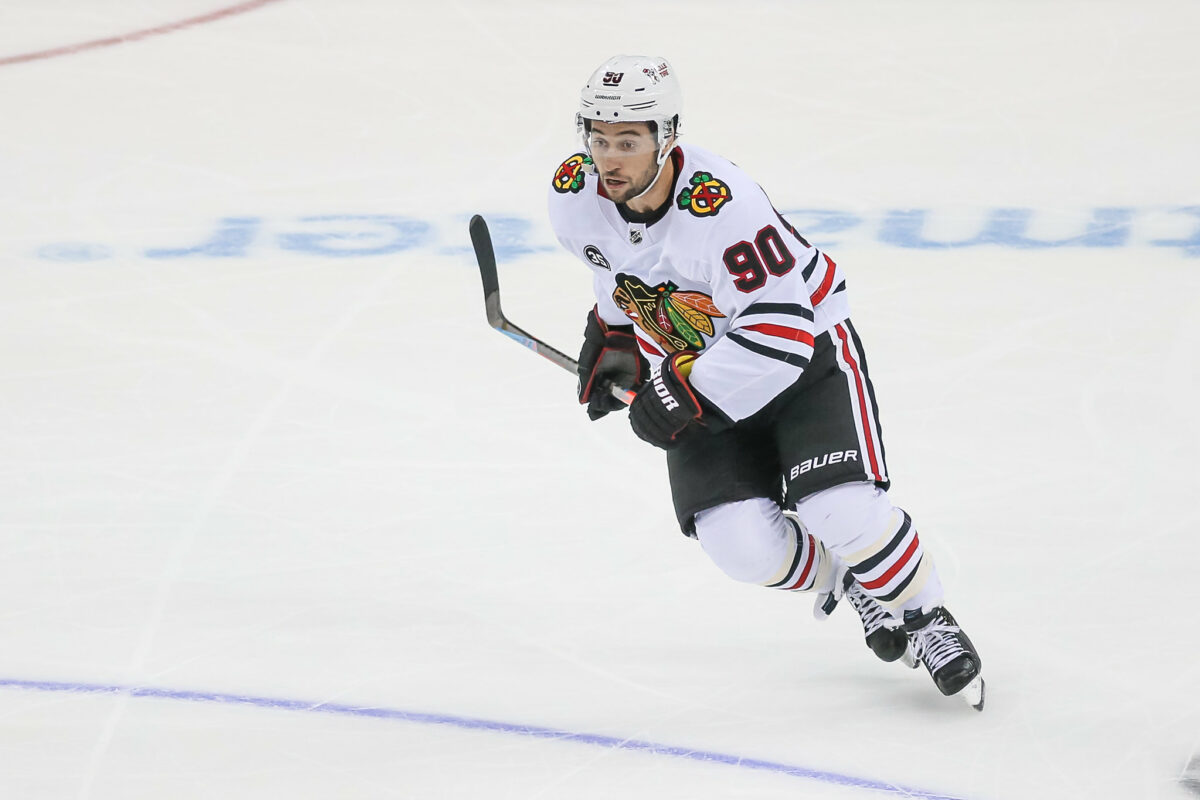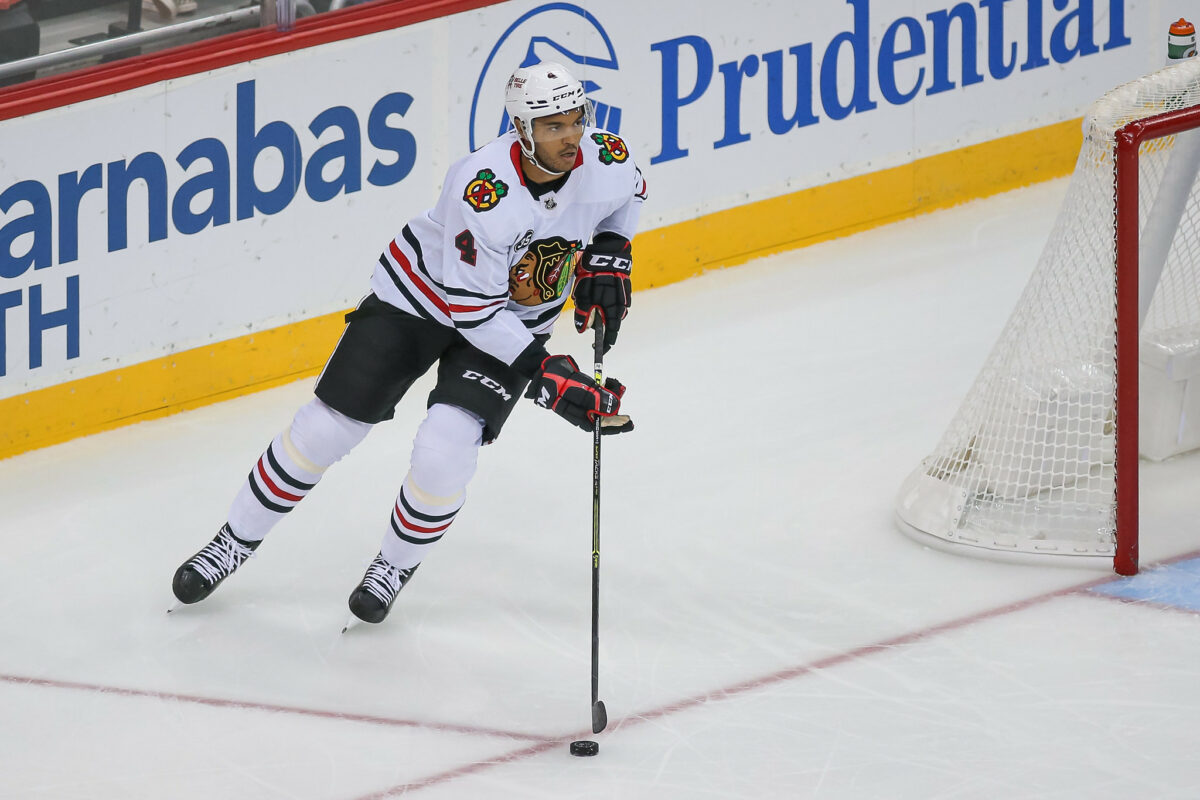Entering the first full season of a rebuild, the Chicago Blackhawks will almost certainly miss the Stanley Cup Playoffs for the fifth time in six seasons. After many unsuccessful attempts to contend since their last championship in 2015, Kyle Davidson pulled the plug and began a long overdue rebuild shortly after he was named permanent general manager in March.
Related: Blackhawks’ 3 Best Contracts Entering the 2022-23 Season
The Blackhawks have undergone a massive front-office overhaul over the last year, but that doesn’t mean the impact of the previous regime is gone. Due to failed attempts to remain competitive, Chicago has a handful of veterans on the = payroll with contracts arguably far above market value. This shouldn’t be a huge problem right now, considering the Blackhawks still have a reasonable $7.5 million in cap space, per CapFriendly. However, they could make future trades more difficult as the team continues to rebuild.
In no particular order, here are the Blackhawks’ three worst contracts entering 2022-23. Note, this list doesn’t include Jonathan Toews (nor Patrick Kane), who are entering the last year of their current deals.
Tyler Johnson — $5 million AAV
To be fair, the Blackhawks should have known what they were getting in Tyler Johnson after they acquired him and his seven-year, $35 million contract from the Tampa Bay Lightning in July 2021. Despite coming off back-to-back Stanley Cups with Tampa Bay, Johnson was years removed from his career season in 2014-15, in which he posted 72 points in 77 games. Since then, the Washington state native emerged into more of a solid middle-six forward while still providing decent offense and some two-way ability.
At the time of the trade, Johnson’s average annual value (AAV) of $5 million was arguably far above his market value. However, any hopes of a return to his career season were dashed when he suffered an upper-body injury just weeks into the season. He then underwent surgery and successfully recovered, but shortly after he returned in March, he suffered a concussion, which made for a mediocre season offensively, with seven points (three goals, four assists) in 26 games f

Of course, with such a small sample size, Blackhawks fans haven’t had much of a chance to get to know Johnson. A best-case scenario for 2022-23 would be to stay healthy and provide consistent middle-six depth. Even a 30-point season from Johnson would be impressive, but it’s kind of tough to see that happening given how much adversity he faced in 2021-22.
With two years remaining on his contract before he becomes an unrestricted free agent (UFA), it’s hard to envision many teams calling about Johnson unless he exceeds expectations and remains healthy. Since they’re not looking to compete, his contract isn’t hurting the Blackhawks, but it isn’t helping them either. It’s possible a contending club would welcome Johnson as a serviceable middle-six forward, but as a Blackhawk, he has yet to prove he is worth his current deal.
Jake McCabe — $4 million AAV
Like Johnson, Chicago acquired Jake McCabe in July 2021 in what seemed like one last attempt to be competitive with Kane and Toews on the roster. Even after spending the first six seasons of his career on a flawed Buffalo Sabres club, McCabe established his reputation as a good shutdown defenseman with a bit of physicality. That’s something the Blackhawks were mostly missing when they signed him last offseason to a four-year contract with an AAV of $4 million, with the hopes he’d be a solid addition to their top-four.
However, McCabe’s first season in Chicago didn’t go to plan. Though he posted a respectable 22 points in 75 games, he ended the campaign with a minus-27 rating and a career-worst 60 giveaways. He also had a pretty ugly start to the year despite playing better toward season’s end.
Related: 3 Blackhawks Prospects Most Likely to Make Opening Night Roster
McCabe mostly thrived in Buffalo despite playing on a bad club. It’s possible he could do the same on the Blackhawks, but his AAV of $4 million was already considered high when the team got him last offseason. It also doesn’t help that he’ll miss at least the first few months of the season due to cervical spine surgery. For a player of his caliber, his term is also pretty lengthy, with three years remaining until he hits the open market in 2025.
When McCabe is fully recovered, by no means will it hurt Chicago to have him around. He brings good leadership, but it makes a trade tougher. It’s hard to say the Blackhawks are getting good value for McCabe after an underwhelming 2021-22 campaign and now that he’s out long-term.
Seth Jones — $9.5 million AAV
Is it a coincidence that three of the Blackhawks’ worst contracts were all acquired during the 2021 offseason? Maybe not. Along with Johnson and McCabe, Chicago acquired defenseman Seth Jones from the Columbus Blue Jackets in July 2021. Previously set to become a UFA this offseason, the Blackhawks signed Jones days after the trade to an eight-year, $76 million extension. Entering 2022-23, Jones’ AAV of $9.5 million is currently the fourth-highest among NHL defensemen, only behind Erik Karlsson, Drew Doughty, and Zach Werenski.
For most rebuilding teams, Jones would be a perfect trade chip and would probably fetch a good return. While he has yet to repeat his 2017-18 campaign, in which he finished fourth in Norris Trophy voting, he’s 27 and has established a reputation as an above-average, offensive-minded defenseman. Most likely, he’ll remain Chicago’s No. 1 defenseman throughout the early stages of their rebuild, which might not be a bad thing. His contract, though, is a massive overpayment for the team — plain and simple.

In theory, Jones still could be a trade chip, but the team would almost certainly need to retain a good portion of his salary to move him. On the other hand, it’s also possible the Blackhawks embrace Jones moving forward to maximize his potential and build around him. Yet, even in the best-case scenario that Jones becomes a centerpiece of the next great Chicago team, he’ll be 35 by the time his contract expires in 2030. Unlike some players, it’s not a guarantee Jones will continue to produce as he ages, and his best days could be behind him at this point.
In his first season as a Blackhawk, Jones posted 51 points in 78 games with a minus-37 rating. Toward the end of the campaign, he held himself accountable for his shortcomings and said he hopes to improve this season (from ‘Seth Jones disappointed with debut season with Blackhawks, but he hasn’t been the problem,’ The Chicago Sun-Times, 04/27/2022). Entering what will be a pretty rough year for the club, Jones will be one to watch to to see how he works with the team’s younger defensemen, Alex Vlasic, Ian Mitchell, and Alec Regula.
Having said that, he just isn’t worth his contract. Depending on how Chicago views Jones, this could hurt the team as it makes it tougher to trade him for assets, unlike some of the young players that were moved this offseason (e.g. Alex DeBrincat, Kirby Dach). His contract could also hurt them later if the team becomes competitive again and struggles to stay under the salary cap, and it’s tough to see Jones and his $9.5 million AAV appealing to other teams as he ages.
Chicago Fans Should Hope for the Best of Johnson, McCabe & Jones
During the 2021-22 season, these three veterans all faced adversity, whether it was injuries or just not living up to expectations. Even though it should be a tough year for the Blackhawks, fans should still hope Johnson and Jones meet or exceed expectations, as well as McCabe when he returns. The recent challenges they’ve faced make them easy players to root for, even though they have yet to prove they are worth their contracts.
It would be remarkable to see one or more of these veterans have a bounce-back season, and with a relatively young team surrounding them, they could serve as great mentors along with Kane and Toews. Compared to Chicago’s recent free-agent signings, though, it’s hard to envision many teams calling about their services unless they drastically improve. To return to contention, the Blackhawks will almost certainly need to continue giving up assets. Having these contracts around, which are arguably all overpayments, doesn’t help that goal.